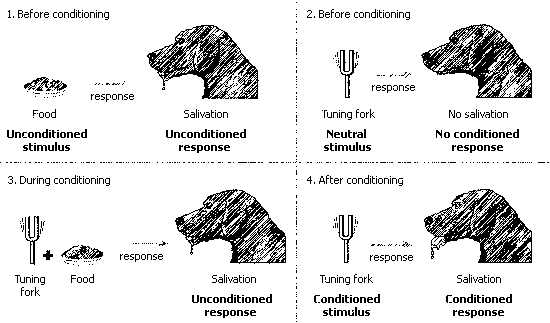His Personal Life
- Ivan Petrovich Pavlov was born September 14, 1849 in the tiny village of Ryazan in Central Russia. He was born into a very religious
 family, the eldest of 10 children.
family, the eldest of 10 children. - His father, Peter Dmitrievich Pavlov was the village priest, and his mother Varvara Ivanovna Pavlova, was the daughter of a priest.
- With his family’s deep religious roots, Pavlov was expected to follow in his father’s footsteps and become the seventh generation priest.
- In 1881, Pavlov married Seraphima Vasilievna Karchevskaya , teacher and daughter of a doctor in the Black Sea fleet.
- After their son, Wirchik died in childhood, Pavlov and his wife had three sons, Vladimir, Victor and Vsevolod, and a daughter, named Vera.
- On February 27, 1936, Pavlov died of pneumoniaat age 87 in Leningrad.
His Education
At age 11, Pavlov attended the Ryazan Ecclesiastical Seminary. Inspired by the progressive ideas of Dimitri Pisarev, Dr. Ivan, Sechenov, and Charles Darwin, he discovered that he was more interested in scientific pursuits than religious studies and left the seminary to attend the University of St. Petersburg. At St. Petersburg, Pavlov studied chemistry and physiology, receiving his doctorate in 1879. He continued to research, focusing on digestion and blood circulation. As his work gradually got recognized, he was appointed professor of physiology at the Imperial Medical Academy. In 1890, he was asked to organize and direct the Department of Physiology at the Institute of Experimental Medicine. Under his 45 years of direction, the Institute became one of the most important places for physiological research.
His Theory of Classical Conditioning
- Pavlov was a behaviourist– his theories were formed on observable behaviour, because he felt that unlike thoughts, behaviour could be observed and was thus a reasonable ground in explaining human behaviour.
- His biggest contribution to the field of psychology is his theory of classical conditioning.
- The behaviour of human beings and animals interested Pavlov. He was especially intrigued by human and animal reflexes- automatic behaviour caused by a stimulus from the environment.
- Pavlov theorized that this automatic reaction (reflex) could be manipulated. This process was called conditioning.
- In the conditioning process, an unconditioned stimulus is given to the subject, which causes a reflex of its own. Now, the unconditional stimulus is given along with the conditional stimulus which doesn’t cause a reflex. After a while, only the conditional stimulus (the one that originally didn’t cause a reflex) is offered, and now it will cause a reflex because the subject has associated that conditional stimulus with the unconditional stimulus.
His Dog Salivation Experiment in Classical Conditioning
- Pavlov’s most famous experiment was the one where he used dogs to demonstrate the concept of classical conditioning.
- The dogs he used salivated (reflex) when they were offered food (unconditional stimulus).
- The food was offered a number of times with the sound of a buzzer (conditional stimulus).
- After a while, the sound of the buzzer alone caused the dogs to salivate even if the food wasn’t present because the dogs associated the sound of the buzzer with food.


Pretty good article love it
You’re amazing! Thanks!
I like the diagram
itz nformative!!!!!!
Could someone please provide more information about Ivan Pavlov’s siblings. What were their names & dates of births & deaths. Thanks
koolio articles..
like this guy is like wow 🙂
Awsome, thanks,
Good article.
Este foarte interesant!